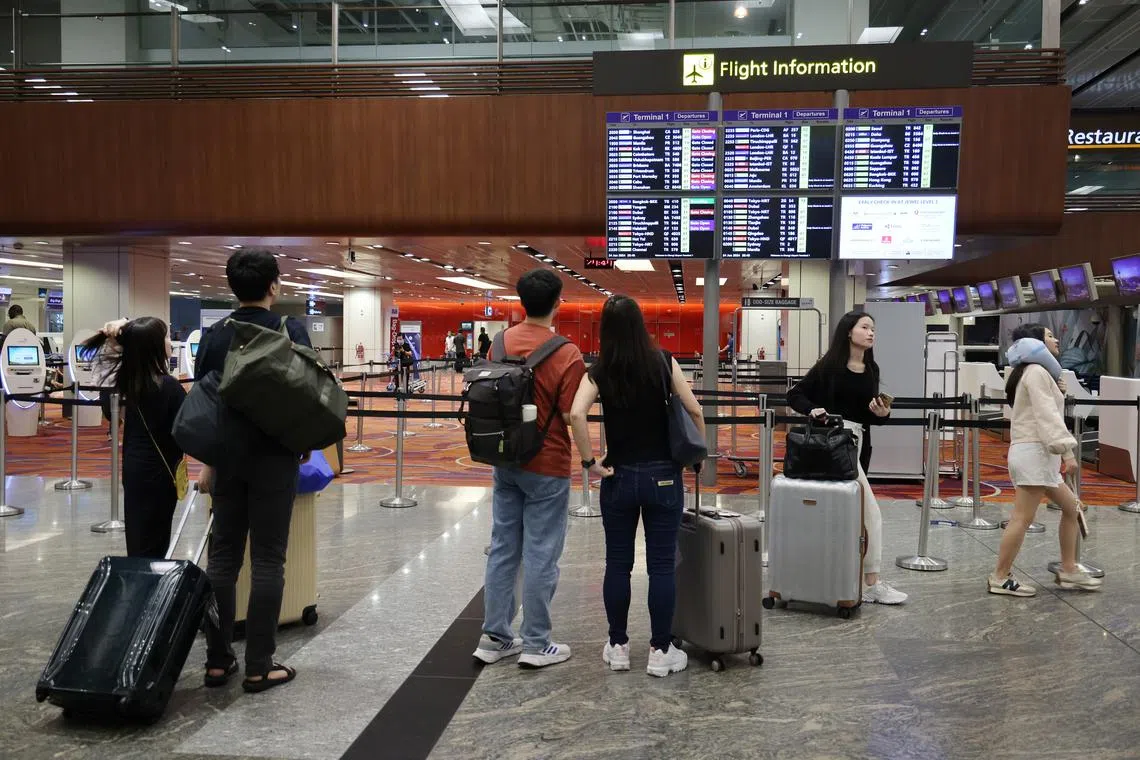Are smartphones, air-con and short holidays essential? Many in Singapore say yes: Study
Sign up now: Get ST's newsletters delivered to your inbox

A trip each year to a South-east Asian destination is also essential, said 56 per cent of those polled.
ST PHOTO: JASON QUAH
Follow topic:
SINGAPORE - More than nine in 10 Singapore residents polled in a new study said a smartphone with a data plan is essential, while 64 per cent think air-conditioning is a must.
A trip each year to a South-east Asian destination is also essential, said 56 per cent of those polled. And social connections are important too, with 90 per cent saying family bonding is essential.
These were among 40 items and activities that respondents deemed essential in the study on household needs conducted by Singapore Management University (SMU) and funded by the Ministry of Social and Family Development (MSF).
It polled a nationally representative sample of around 4,000 Singapore residents and comes amid growing public interest in the resources needed to achieve basic living standards.
Respondents were asked how essential they considered a total of 51 items and activities across categories such as household appliances, digital connectivity and social participation.
Essential items were those perceived to be so by at least half the respondents.
The study – which also included respondents taking part in focus group discussions between May 2022 and February 2023 – focused on affordability of essential items and attitudes on poverty.
For example, two-thirds of respondents said they were able to afford all the items deemed essential.
For the remaining one-third, the top essential items they cited being unable to access or afford included emergency savings of at least three months of expenses and an annual overseas vacation in a South-east Asian country.
A separate study done by the Institute of Policy Studies (IPS) that garnered 2,000 responses collected in June 2024 looked at public perceptions of who should provide for essential needs, be it the Government, the community, the individuals themselves or other parties.
Key findings from both studies were presented on July 12 at the SMU-DBS Foundation Symposium on Essential Household Needs in Singapore.
Director of SMU Centre for Research on Successful Ageing Paulin Straughan, who led the first study, said the hope is to reveal the gaps that may aid efforts to help disadvantaged Singaporeans break out of deprivation, which is defined in the study as being unable to afford items considered essential.
Sharing other insights, she noted that perceptions towards higher expenditure activities and items like holidays and the need for adequate savings differed across income groups.
Households in the lowest income group earned up to $2,499 a month while the top band earned over $17,000 a month.
One in two among the lowest income band see dining at restaurants once a month as essential, compared with over 60 per cent in higher income bands.
And only 49 per cent in the lowest income band see air-con as essential, compared with 70 per cent in the highest income band.
Items deemed unnecessary by respondents included private tuition – considered essential by 49 per cent of respondents – private enrichment classes (30 per cent) and annual staycations (27 per cent).
Respondents thought students can get help from free tuition classes offered by self-help groups rather than more costly private options – such tuition classes were seen by nearly 60 per cent of respondents as essential.
On poverty, the study showed that most believed it is attributable to personal actions and circumstances. Some 80 per cent think people are poor because they face major problems in their lives, while less than a quarter agreed that poverty is due to external factors like bad luck or divine will.
Prof Straughan said: “There’s a lot more consensus on what we can do to help ourselves... it tells us that from an approach perspective, Singaporeans can be helped and they are willing to be helped.”
She said the next run of the study may be done in five years’ time, to see if new interventions introduced can plug the gaps found, such as the lack of emergency savings.
Speaking at the symposium on July 12, Minister for Social and Family Development Masagos Zulkifli said the studies by SMU and IPS will inform MSF’s ongoing review of its ComCare scheme for low-income families. He cited how ComCare assistance now covers mobile data plans as digital connectivity has become an essential need.
“We will continue to adjust our policies and programmes, recognising that needs evolve over time,” he said.
Mr Masagos said the research shows there are differing views on what needs are deemed essential, particularly for items that go beyond subsistence needs.
Implicit in these views is the public’s understanding that social assistance provided by taxpayers must be reasonable and sustainable, he added.
“The studies also show that there is much room for others besides the Government to provide support for low-income and vulnerable families.”

